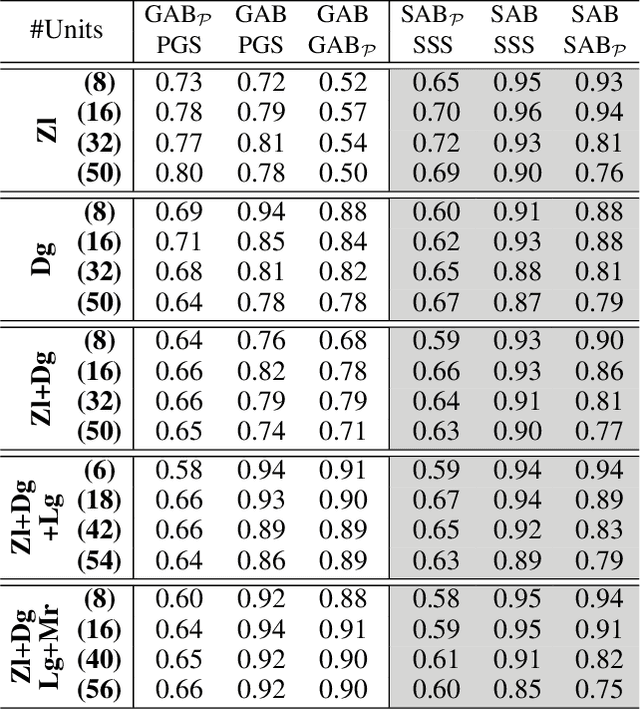Rubens O. Moraes
InnateCoder: Learning Programmatic Options with Foundation Models
May 18, 2025Abstract:Outside of transfer learning settings, reinforcement learning agents start their learning process from a clean slate. As a result, such agents have to go through a slow process to learn even the most obvious skills required to solve a problem. In this paper, we present InnateCoder, a system that leverages human knowledge encoded in foundation models to provide programmatic policies that encode "innate skills" in the form of temporally extended actions, or options. In contrast to existing approaches to learning options, InnateCoder learns them from the general human knowledge encoded in foundation models in a zero-shot setting, and not from the knowledge the agent gains by interacting with the environment. Then, InnateCoder searches for a programmatic policy by combining the programs encoding these options into larger and more complex programs. We hypothesized that InnateCoder's way of learning and using options could improve the sampling efficiency of current methods for learning programmatic policies. Empirical results in MicroRTS and Karel the Robot support our hypothesis, since they show that InnateCoder is more sample efficient than versions of the system that do not use options or learn them from experience.
Searching for Programmatic Policies in Semantic Spaces
May 08, 2024Abstract:Syntax-guided synthesis is commonly used to generate programs encoding policies. In this approach, the set of programs, that can be written in a domain-specific language defines the search space, and an algorithm searches within this space for programs that encode strong policies. In this paper, we propose an alternative method for synthesizing programmatic policies, where we search within an approximation of the language's semantic space. We hypothesized that searching in semantic spaces is more sample-efficient compared to syntax-based spaces. Our rationale is that the search is more efficient if the algorithm evaluates different agent behaviors as it searches through the space, a feature often missing in syntax-based spaces. This is because small changes in the syntax of a program often do not result in different agent behaviors. We define semantic spaces by learning a library of programs that present different agent behaviors. Then, we approximate the semantic space by defining a neighborhood function for local search algorithms, where we replace parts of the current candidate program with programs from the library. We evaluated our hypothesis in a real-time strategy game called MicroRTS. Empirical results support our hypothesis that searching in semantic spaces can be more sample-efficient than searching in syntax-based spaces.
The NES Video-Music Database: A Dataset of Symbolic Video Game Music Paired with Gameplay Videos
Apr 05, 2024Abstract:Neural models are one of the most popular approaches for music generation, yet there aren't standard large datasets tailored for learning music directly from game data. To address this research gap, we introduce a novel dataset named NES-VMDB, containing 98,940 gameplay videos from 389 NES games, each paired with its original soundtrack in symbolic format (MIDI). NES-VMDB is built upon the Nintendo Entertainment System Music Database (NES-MDB), encompassing 5,278 music pieces from 397 NES games. Our approach involves collecting long-play videos for 389 games of the original dataset, slicing them into 15-second-long clips, and extracting the audio from each clip. Subsequently, we apply an audio fingerprinting algorithm (similar to Shazam) to automatically identify the corresponding piece in the NES-MDB dataset. Additionally, we introduce a baseline method based on the Controllable Music Transformer to generate NES music conditioned on gameplay clips. We evaluated this approach with objective metrics, and the results showed that the conditional CMT improves musical structural quality when compared to its unconditional counterpart. Moreover, we used a neural classifier to predict the game genre of the generated pieces. Results showed that the CMT generator can learn correlations between gameplay videos and game genres, but further research has to be conducted to achieve human-level performance.
Choosing Well Your Opponents: How to Guide the Synthesis of Programmatic Strategies
Jul 24, 2023Abstract:This paper introduces Local Learner (2L), an algorithm for providing a set of reference strategies to guide the search for programmatic strategies in two-player zero-sum games. Previous learning algorithms, such as Iterated Best Response (IBR), Fictitious Play (FP), and Double-Oracle (DO), can be computationally expensive or miss important information for guiding search algorithms. 2L actively selects a set of reference strategies to improve the search signal. We empirically demonstrate the advantages of our approach while guiding a local search algorithm for synthesizing strategies in three games, including MicroRTS, a challenging real-time strategy game. Results show that 2L learns reference strategies that provide a stronger search signal than IBR, FP, and DO. We also simulate a tournament of MicroRTS, where a synthesizer using 2L outperformed the winners of the two latest MicroRTS competitions, which were programmatic strategies written by human programmers.
Asymmetric Action Abstractions for Multi-Unit Control in Adversarial Real-Time Games
Nov 22, 2017

Abstract:Action abstractions restrict the number of legal actions available during search in multi-unit real-time adversarial games, thus allowing algorithms to focus their search on a set of promising actions. Optimal strategies derived from un-abstracted spaces are guaranteed to be no worse than optimal strategies derived from action-abstracted spaces. In practice, however, due to real-time constraints and the state space size, one is only able to derive good strategies in un-abstracted spaces in small-scale games. In this paper we introduce search algorithms that use an action abstraction scheme we call asymmetric abstraction. Asymmetric abstractions retain the un-abstracted spaces' theoretical advantage over regularly abstracted spaces while still allowing the search algorithms to derive effective strategies, even in large-scale games. Empirical results on combat scenarios that arise in a real-time strategy game show that our search algorithms are able to substantially outperform state-of-the-art approaches.
 Add to Chrome
Add to Chrome Add to Firefox
Add to Firefox Add to Edge
Add to Edge